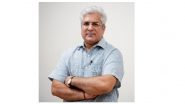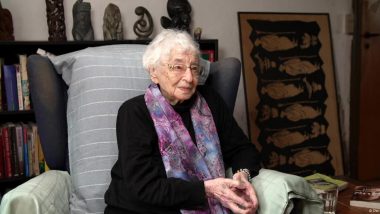As South African journalist Ruth Weiss turns 100, DW spoke with her about her lifelong commitment to seeking justice for those experiencing racism and antisemitism.South African journalist Ruth Weiss has lived a life defined by her commitment to fighting discrimination and racism. Even in her 100th year, the writer and journalist is still a sought-after commentator who warns against antisemitism, racism, and the exclusion of anyone who thinks outside of the box.
Escape into exile
Weiss has been fighting for justice her whole life. Born Ruth Löwenthal on July 26, 1924 to Jewish parents in Fürth, Franconia. Her family lived near the Nazistronghold of Nuremberg when Hitler came to power in 1933.
She and the Jewish community quickly felt the hatred against Jews. "From one day to the next I no longer existed for the teacher. He no longer called on me at class" she told DW. Her father lost his job and couldn't find a new one. Fortunately, a family member in Johannesburg wrote with a job opportunity, and the family immigrated.
The ship on which they left Hamburg was one of the last to sail to South Africa. But young Ruth quickly realized that she was not welcome there either. "I have to say that we went from one antisemitic country to another. I went to a very poor school in a poor district. I could feel that I wasn't accepted by my classmates," Weiss told DW. "The reason was the same as in Germany."
Her experiences made it impossible to accept the marginalization brought about by apartheid in South Africa. Apartheid was established by the state in 1948 and was the authoritarian self-declared domination of white people of European descent over all other groups. "We had the 'right' skin color," she told DW, "but the 'wrong' religion," she said.
The Löwenthal family ran a grocery store in Johannesburg. Every day, young Ruth observed how white police officers humiliated Black South Africans.Her experiences under two dictatorships solidified her commitment to human rights.
Stepping into journalism
After graduating from high school, Weiss worked at a law firm. During this time, she began to meet other like-minded people who opposed apartheid in a cultural association, including her future husband, journalist Hans Weiss.
She began writing under his name, reporting for European media on the atrocities of apartheid and the growing resistance of Black South Africans. She gained a name for herself as a ruthless reporter who was unafraid to speak out against apartheid and its horrors.
During this time, Weiss took numerous reporting trips throughout the African continent.
Fight against apartheid
When her marriage broke down in the 1960s, her journalistic career took off. She became a renowned financial journalist and political reporter who was openly sympathetic to the independence movements in Zambia and Zimbabwe as well as anti-apartheid efforts in South Africa.
Weiss made contact with numerous personalities in African independence movements, including the future dictator of Zimbabwe, Robert Mugabe, Zambia's former president, Kenneth Kaunda, and South Africa's liberation heroNelson Mandela.
She interviewed Mandela while he was in hiding before his arrest in 1963. The South African regime reacted harshly. She was not allowed to return to the country from a trip abroad. "I was only allowed to go back for one night to say goodbye to my parents. My son was 2 months old" she recalled.
The journalist then worked in exile in London, writing for a number of established newspapers.
Freedom instead of colonialism
From 1975 to 1978, Weiss and her son Sascha lived in Cologne, where she was the head of Deutsche Welle's Africa desk. Often, she was the only woman on the job. Weiss was not able to return to South Africa until the early 1990s when apartheid had come to an end.
It was not until 2002 that Weiss returned to Germany permanently, moving to Lüdinghausen in Westphalia. Three years later, she was nominated for the Nobel Peace Prize.
Looking back, Weiss says her participation in the independence celebrations in Kenya in 1963 made a major impression on her.
At that time, the British colonial forces were withdrawing from the country. "It was just such a joy, such a relief after all those years," she told DW. "It was a new beginning, you had such hope for the time of decolonization."
"Many Europeans still think that they live in colonial conditions and that African countries are just the purveyors of wealth. That has to change" she told DW.
Germany has not done enough to counteract this either, she says, mentioning Germany's colonial politics in present-day Namibia. Colonialism has hindered Africa's development, she stresses.
'Never completely left Africa'
In the past decades, Weiss has been sharing her experiences to raise awareness of injustice, writing novels and speaking to school classes about her experiences. Her book for young people, "My Sister Sara," is required reading in many schools.
She has received numerous awards for her commitment. A secondary school in Aschaffenburg, Germany has been named after her, and she has been honorary president of the PEN Center for German-speaking authors abroad since 2020.
In 2014, Weiss received Germany's Federal Cross of Merit First Class, and in 2023 the prestigious South African National Order "Companions of O.R. Tambo," named after Oliver Reginald Tambo, former president of the African National Congress. In April 2024, she was awarded the Grand Cross of the Order of Merit of the Federal Republic of Germany.
Weiss still follows political debates and events in southern Africa and around the world.
A turbulent life between the continents brings with it the question of her homeland, she writes in her biography "Wege im harten Gras," ("Paths through Tough Grass") published in 2016.
"I have never completely left Africa," she told DW in an interview. Her home, she says, is where people walk in stride with her, " where people don't just focus on their careers, but care about other people. I'm glad that so many people have taken that seriously, that's my home."
Joselyn Mahachi contributed to this article.
Adapted from German by: Martina Schwikowski
Edited by: Sarah Hucal
(The above story first appeared on LatestLY on Jul 25, 2024 02:20 PM IST. For more news and updates on politics, world, sports, entertainment and lifestyle, log on to our website latestly.com).













 Quickly
Quickly




















